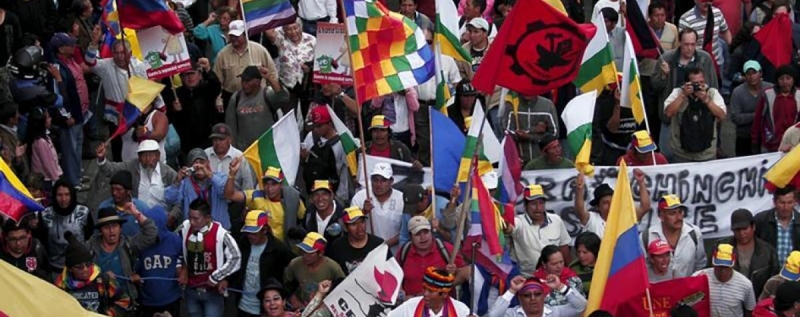Ecuador: Intense debate on freedom of expression, public protests and rights of indigenous peoples
Published on 12 Jul 2016, 12:02 PM
 Protesters march in Quito, August 2015
Protesters march in Quito, August 2015
At the 117th session, the Human Rights Committee reviewed the 6th periodic report of Ecuador, one of the few States that has ratified every treaty on Human Rights it could: it is a State party to every universal/U.N.-negotiated convention on Human Rights and every inter-American treaty on Human Rights. Taking place on the 27th and 28th of June, the review of Ecuador offered a heated debate, notably on issues regarding the deterioration of freedom of expression, the excessive use of force by police agents during demonstrations, and the treatment of indigenous communities in Ecuadorian society.
"The worst thing that can happen to a Government is censorship, in which one cannot speak freely... we can’t be intolerant with criticism because that’s what democracy is about."
- (Member of the Human Rights Committee)
Freedom of speech
In his introductory speech, the Minister of Foreign affairs, Head of the Delegation of Ecuador, said there was “absolute freedom of speech in Ecuador” despite a “lot of attacks from international press”. The Committee seized upon this the opportunity to relate NGOs’ concerns about the Organic Communications Law, said to allow for large restrictions to the freedom of speech. The members of the Committee therefore questioned the Government on media interferences and excessive control of social media, especially when criticising Ecuadorian president R. Correa, and requested explanations for the high number of fines given to journalists. “The worst thing that can happen to a Government is censorship, in which one cannot speak freely”, stated one Committee member, adding that “we can’t be intolerant with criticism because that’s what democracy is about”.
The Committee concluded by asking if all these allegations were “urban legends”. These questions made the Head of Delegation chuckle, who answered that even though the Organic Communications Law “may seem inconsistent” with the ICCPR, the freedom of expression is a right that can be limited. According to him, this law stemmed from an Ecuadorian history of threats and misinformation: there is a right for citizen to have access to clear information and to be able to debate with “good” information. “One should not conflate [the] State’s struggle against political actions aiming at slowing down the transformation of society and censorship”, the Head of Delegation said.
Public demonstrations
Another issue that was raised by the Head of Delegation in its introductory speech was the violence surrounding public demonstrations. Using the same rhetoric as was used for the freedom of expression, he stated that it is legitimate to restrict the right to peaceful assembly when facing “violent and organised protests”. The Committee said that excessive use of force during demonstrations was “a phenomenon [it] was familiar with”: sometimes peaceful demonstrations can be highjacked by violent individuals and provoke challenges for police, but it is “also true that sometimes the violence of a few can be used as a pretext to take illegal action against the majority of peaceful demonstrators”.
Citing a Human Rights Watch report, the Committee gave the example of a November 2015 demonstration during which police beat and arbitrarily arrested people, randomly breaking into people’s homes because a minority of demonstrators attacked the police. The Committee put forward the case of Manuela Picq, a foreign journalist who has seen her visa revoked because of her involvement in this demonstration. The Delegation answered these allegations by saying that police officers acted in accordance with the Covenant since they used no lethal weapons and were pursuing the legitimate aim of protecting individuals against violence. The Government said that in any case there was “no right to aggress policemen”.
Rights of indigenous peoples
Finally, the Committee expressed its concerns regarding the treatment of the indigenous community, relating views expressed by international actors, in particular the Inter-American Court of Human Rights, according to which there is a lack of involvement of indigenous populations in the decisions dealing with their own territory. There should be a prior, free and mandatory consent from the indigenous populations when it comes to decisions affecting them, the Committee said. The Delegation denounced the “infantilisation” of indigenous peoples, stating that one “shouldn’t talk about indigenous as if they were one entity”, and that it was the problem with “white people”, talking in their name through a “euro-centric approach”. The Delegation concluded by saying that “the picture of Government against indigenous people is obsolete”, because President R. Correa got 63% of their vote.
Recommendations of the Committee
The Concluding Observations for which the State should provide information on the implementation within one year, concern:
- The Truth Commission: Ecuador should speed up the judiciary investigations and ensure that the presumed responsible persons are tried and convicted according to the seriousness of their acts. Ecuador should also increase its efforts to ensure that the victims are quickly granted access to full reparations.
- Conditions of detention and violence in prisons: Ecuador should increase its efforts to keep improving the living conditions in prisons and eliminate overcrowding. Ecuador is also recommended to redouble efforts to prevent and end violence in places of deprivation of liberty, and continue to ensure that all cases of violence between inmates are investigated.
- Freedom of expression and peaceful assembly: Ecuador should adopt adequate means to ensure that every individual within its jurisdiction can exercise, in practice, its right to peaceful assembly and redouble its efforts to prevent and eliminate effectively every form of excessive force used by law enforcement officials and security forces.
The next (seventh) periodic report of Ecuador should be submitted by 15 July 2021.
Photo credit: https://www.hrw.org/news/2015/11/10/ecuador-crackdown-protesters
 Protesters march in Quito, August 2015
Protesters march in Quito, August 2015

